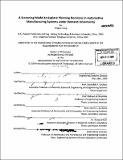A screening model to explore planning decisions in automotive manufacturing systems under demand uncertainty
Author(s)
Yang, Yingxia
DownloadFull printable version (19.37Mb)
Other Contributors
Massachusetts Institute of Technology. Engineering Systems Division.
Advisor
Randolph Kirchain.
Terms of use
Metadata
Show full item recordAbstract
Large-scale, complex engineering systems, as for automotive manufacturing, often require significant capital investment and resources for systems configuration. Furthermore, these systems operate in environments that are constantly changing due to shifts in macroeconomic, market demand and regulations, which can significantly influence systems' performance. It is often very difficult or prohibitively expensive to change these engineering systems once they are in place. Thus, a critical question is how to design engineering systems so they can perform well under uncertainty. Conventional engineering practice often focuses on the expected value of future uncertainties, thus leaving the value of flexible designs unexplored. This research develops a new framework to design and plan large-scale and complex manufacturing systems for uncertainty. It couples a screening model to identify promising candidate solutions with an evaluation model to more extensively quantify the performance of identified solutions. The screening model adaptively explores a large decision space that is otherwise computationally intractable for conventional optimization approach. It integrates strategic and operational flexibility in a system to allow systematic consideration of multiple sources of flexibility with uncertainty. It provides a means to search the space for system's improvement by integrating the adaptive one-factor-at-a-time (OFAT) method with a Response Surface method and simulation-based linear optimization. The identified solution is then examined with Value at Risk and Gain chart and a statistics table. (cont.) Two cases are studied in this thesis. The first case is a simple hypothetical case with two products and two plants. It considers product to plant allocation, plant capacity, and overtime operation decisions that affect manufacturing flexibility. It demonstrates the value of considering demand uncertainty and overtime operational flexibility in making manufacturing planning decisions and the interactions between multiple sources of flexibility. The second case explores these manufacturing planning decisions for Body-In-White assembly systems in the automotive industry by applying the developed screening model. It shows that the screening model leads to system design with about 40% improvement in expected net present value, reduced downside risks and increased upside gains as compared to a traditional optimization approach.
Description
Thesis (Ph. D.)--Massachusetts Institute of Technology, Engineering Systems Division, 2009. Cataloged from PDF version of thesis. Includes bibliographical references (p. 191-197).
Date issued
2009Department
Massachusetts Institute of Technology. Engineering Systems DivisionPublisher
Massachusetts Institute of Technology
Keywords
Engineering Systems Division.